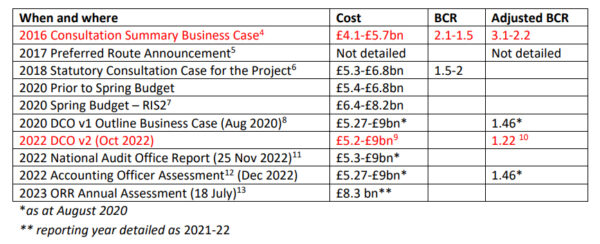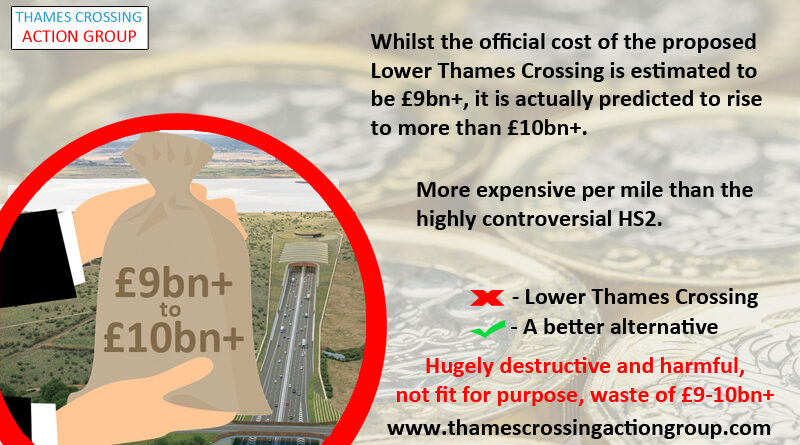Cost of the proposed LTC
We all know what the true costs are to our lives, health, homes, communities, green belt, ancient forests, agricultural land, wildlife, countryside etc. What about the financial cost in figures! What is the estimated cost per mile of LTC?
Well, the cost just keeps rising, and according to the Funding Statement, one of the many newly released LTC DCO application documents, shows that the official estimated cost of the proposed LTC is now up to £9bn. However, many predict the cost would actually be over £10bn+, if the LTC goes ahead.
The National Audit Office have also voiced concerns about value for money issues on various road projects, including the LTC.
And this is tax payers money, and we’ll be charged to use it too if it goes ahead!
And that’s not even the true cost!
As we all know projects of this size and scale never run to budget, so we can safely presume that the overall cost for LTC will be over £9-10bn.
In addition to the cost of the actual project in monetary terms there is of course also the cost to our lives, health, communities etc. The environmental cost with the loss of greenbelt land, ancient woodland, grade 1 agricultural land, countryside, impacts to wildlife and their habitats.
How do you put a price on all of that? How much will end up being spent in NHS costs as a direct result of the air pollution related illness caused by the LTC Toxic Triangle?
Thurrock Council have published a report that states at least £150m in loss to Thurrock as a direct result of LTC if it goes ahead, and that was back in 2020. If one impacted local authority reports this kind of impact then surely it can be considered that the other impacted areas will also be impacted in a similar way?
Not forgetting that the Dartford Crossing will still also be over capacity even if LTC goes ahead, so more money will need to be spent trying to fix that. So all this cost in so many ways and forms, yet the original issue that the LTC was meant to address will still not be solved.
National Highways had been keeping the ever rising cost as quiet as they can, not even mentioning it in consultations. It has only been since the DCO application documents were published that we saw their latest estimate, which many still find hard to believe and expect it to rise further.
In February 2024 the Infrastructure and Projects Authority published their Analysis of the National Infrastructure and Construction Pipeline 2023 report, which highlights that construction material prices are over 40% higher than in January 2020. Since the current estimated cost for the proposed LTC is as at August 2020, this suggests that the estimates are likely to be inaccurate.
To date there is only an Outline Business Case for the proposed LTC. The Full Business Case is not produced until after permission for large projects is granted (if it is granted). We believe this to be akin to signing a blank cheque, as the project would be given permission based on an outdated estimated cost, and we all know historically large project soar in price.
Find out more about the ever rising cost and ever dropping Benefit Cost Ration, False Economy, and other cost related info
 The table above highlights the estimated cost and BCR at key points in the process.
Ref points for table can be found at the bottom of this section.
This clearly highlights that prior to the Secretary of State for Transport’s Preferred Route
Announcement the estimated cost was between £4.1bn-£5.7bn, and is now up to £5.27-£9bn. The
adjusted BCR has dropped from 3.1 to 1.22. As previously stated these figures are as at August
2020, and that bearing in mind the previous details above, even that is questionable, and is
predicted by many (including MPs) to rise above £10bn, which would of course then lead to the
already low BCR dropping even further.
Clearly the LTC DCO application is using out of date estimated costs as at August 2020. The
Secretary of State will therefore be making a decision on whether to grant the DCO for the
proposed LTC based on outdated information, as the Full Business Case won’t be made available
until after a DCO is made. How can this not be considered anything other than a huge risk,
particularly when we are talking about a project with such a huge and complex expensive project?
4 - https://highwaysengland.citizenspace.com/ltc/lower-thames-crossing-consultation/user_uploads/lower-thames-crossing-consultation-summary-business-case.pdf
5 - https://www.gov.uk/government/news/new-lower-thames-crossings-to-cut-congestion-and-create-thousands-of-jobs
6 -https://highwaysengland.citizenspace.com/ltc/consultation/supporting_documents/LTC%205%20The%20Case%20for%20the%20Project.pdf
7 - https://assets.publishing.service.gov.uk/government/uploads/system/uploads/attachment_data/file/871978/road-investment-strategy-2-2020-2025.pdf?fbclid=IwAR1zVjsJCNRm824tsmPU5poQUem2hpMmoQ9OtoDsrJ_U6Uvj3J2qD5P_Qls
8 - https://nationalhighways.co.uk/media/w3rlnonz/ltc-obc-2022-foi-3385-ic-182335-r3f3_redacted.pdf
9 - https://infrastructure.planninginspectorate.gov.uk/wp-content/ipc/uploads/projects/TR010032/TR010032-001251-4.3%20Funding%20Statement.pdf
10 - https://infrastructure.planninginspectorate.gov.uk/wp-content/ipc/uploads/projects/TR010032/TR010032-001321-7.7%20Combined%20Modelling%20and%20Appraisal%20Report.pdf
11 - https://www.nao.org.uk/wp-content/uploads/2022/11/Report-Progress-with-the-second-road-investment-strategy-2020-to-2025.pdf
12 - https://www.gov.uk/government/publications/government-major-projects-portfolio-accounting-officer-assessments/lower-thames-crossing-accounting-officer-assessment-december-2022#regularity
13 - https://www.orr.gov.uk/sites/default/files/2023-07/annual-assessment-of-national-highways-performance-2023-web.pdf
The table above highlights the estimated cost and BCR at key points in the process.
Ref points for table can be found at the bottom of this section.
This clearly highlights that prior to the Secretary of State for Transport’s Preferred Route
Announcement the estimated cost was between £4.1bn-£5.7bn, and is now up to £5.27-£9bn. The
adjusted BCR has dropped from 3.1 to 1.22. As previously stated these figures are as at August
2020, and that bearing in mind the previous details above, even that is questionable, and is
predicted by many (including MPs) to rise above £10bn, which would of course then lead to the
already low BCR dropping even further.
Clearly the LTC DCO application is using out of date estimated costs as at August 2020. The
Secretary of State will therefore be making a decision on whether to grant the DCO for the
proposed LTC based on outdated information, as the Full Business Case won’t be made available
until after a DCO is made. How can this not be considered anything other than a huge risk,
particularly when we are talking about a project with such a huge and complex expensive project?
4 - https://highwaysengland.citizenspace.com/ltc/lower-thames-crossing-consultation/user_uploads/lower-thames-crossing-consultation-summary-business-case.pdf
5 - https://www.gov.uk/government/news/new-lower-thames-crossings-to-cut-congestion-and-create-thousands-of-jobs
6 -https://highwaysengland.citizenspace.com/ltc/consultation/supporting_documents/LTC%205%20The%20Case%20for%20the%20Project.pdf
7 - https://assets.publishing.service.gov.uk/government/uploads/system/uploads/attachment_data/file/871978/road-investment-strategy-2-2020-2025.pdf?fbclid=IwAR1zVjsJCNRm824tsmPU5poQUem2hpMmoQ9OtoDsrJ_U6Uvj3J2qD5P_Qls
8 - https://nationalhighways.co.uk/media/w3rlnonz/ltc-obc-2022-foi-3385-ic-182335-r3f3_redacted.pdf
9 - https://infrastructure.planninginspectorate.gov.uk/wp-content/ipc/uploads/projects/TR010032/TR010032-001251-4.3%20Funding%20Statement.pdf
10 - https://infrastructure.planninginspectorate.gov.uk/wp-content/ipc/uploads/projects/TR010032/TR010032-001321-7.7%20Combined%20Modelling%20and%20Appraisal%20Report.pdf
11 - https://www.nao.org.uk/wp-content/uploads/2022/11/Report-Progress-with-the-second-road-investment-strategy-2020-to-2025.pdf
12 - https://www.gov.uk/government/publications/government-major-projects-portfolio-accounting-officer-assessments/lower-thames-crossing-accounting-officer-assessment-december-2022#regularity
13 - https://www.orr.gov.uk/sites/default/files/2023-07/annual-assessment-of-national-highways-performance-2023-web.pdf
"Over £800m has been spent on the Lower Thames Crossing project to date. This is not solely on planning costs and is across the project, including technical surveys and investigations, land purchasing costs as well as on the three major National Highways contracts to deliver the Lower Thames Crossing"A Freedom of Information request was submitted to ask that National Highways provide a breakdown of how much of this "over £800m" has been spent on: 1) Planning costs (each of the two, separate DCO applications) 2) Consultations 3) Technical surveys and investigations 4) Land purchasing costs 5) The three major National Highways contracts The response was: Cost to Feb-23 1) Planning costs (each of the two, separate DCO applications) £245.3m (or £294.36m with VAT) 2) Consultations 27.0 (£23.4m) 3) Technical surveys and investigations 307.4 (£368.88m) 4) Land purchasing costs 97.7 (£117.24m) 5) The three major National Highways contracts 2.6 (£3.12m) Total 680.1 (or £816.12m with VAT) The biggest costs so far are for technical surveys and investigations, and evidently these costs are non-recoverable and known as "sunk costs", so will not be added to the final bill for the LTC, skewing its poor BCR. Additionally, notice how low low in comparison the cost of consultation has been, and let's not forget the fact that two DCO applications were submitted was due to the first attempt not being adequate.
Ask yourself whether you really feel that spending £9-10bn+ of tax payers money is good value for money, for a project that doesn’t even fulfil it’s original task to solve the problems at the Dartford Crossing.
Related
LTC Value for Money issues – click here
New Civil Engineer – LTC DCO application cost £266.7m (Dec 2022) – click here
We added a new update in July 2021 after the Office of Rail and Roads released a new report that specifically comments on the rising cost of LTC – click here
New Civil Engineer – Lower Thames Crossing opponents claim £8.2bn price tag is ‘not realistic’ (Sept 2021) – click here
TCAG 2021 Spending Review Representation – click here
Road Investment Strategy 2 report was released alongside the Spring Budget 2020 – click here

